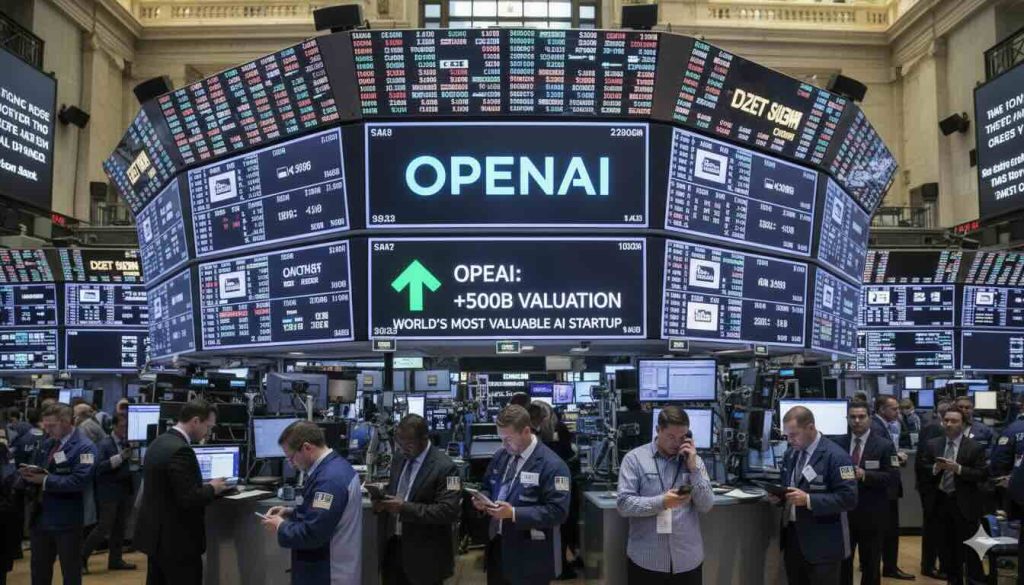OpenAI has reached a landmark valuation of $500 billion following a major secondary stock sale, potentially making it the most valuable startup in the world, surpassing SpaceX and ByteDance, the parent company of TikTok. The deal, designed to retain employees, saw current and former OpenAI staff sell $6.6 billion worth of shares to a select group of global investors, reflecting the extraordinary confidence in the future of artificial intelligence.
The investors included Thrive Capital, Dragoneer Investment Group, T. Rowe Price, SoftBank, and the UAE-based MGX, according to sources familiar with the transaction. This valuation marks a continuation of OpenAI’s meteoric rise from its beginnings in 2015 as a nonprofit AI research lab to its current role as the global leader in generative AI innovation.
OpenAI’s rapid ascent is fueled by investor belief that its flagship technologies such as ChatGPT, DALL·E, and Sora will define the next wave of AI adoption across industries. Yet with the company still not turning a profit, experts warn of potential risks and the possibility of an AI investment bubble if generative AI adoption fails to meet the expectations driving billions of dollars in venture capital.
Leadership’s Response to Bubble Fears
CEO Sam Altman has addressed concerns about overvaluation and speculation. On a recent visit to a massive AI data center under construction in Abilene, Texas, Altman said that cycles of “booms and busts” are inevitable but insisted the long-term potential of AI is undeniable. He emphasized that despite short-term missteps or capital misallocations, AI will ultimately fuel unprecedented economic growth, scientific breakthroughs, and new avenues for human creativity.
New Business Ventures and Competition
This week, OpenAI announced two fresh initiatives to expand its commercial reach: a partnership with Etsy and Shopify that integrates AI-powered shopping experiences into ChatGPT, and the launch of Sora, a social media platform designed for generating and sharing AI-generated videos. These moves come as competitors like Meta Platforms aggressively expand their own AI divisions, offering top-tier salaries and recruiting talent from rival startups, including Scale AI, which recently received a $14.3 billion investment.
Despite stiff competition, OpenAI’s unique structure a for-profit subsidiary governed by its nonprofit board gives it access to massive capital while still being legally bound to pursue a mission with charitable intent. However, this unusual arrangement has drawn scrutiny from regulators, particularly attorneys general in California and Delaware, who monitor the compliance of charitable organizations.
Strategic Partnerships and Infrastructure
OpenAI has also signed major deals in recent weeks with Oracle and SoftBank to support its Stargate data center project, as well as with Nvidia, the dominant supplier of AI chips. While Microsoft has long been its key financial and infrastructure partner, OpenAI has signaled it may reduce reliance on the tech giant as it broadens its investor base and infrastructure strategy.
In parallel, OpenAI announced a $50 million grant program for nonprofits, designed to fund projects that enhance public understanding of AI, explore community-driven applications of the technology, and create economic opportunities. Applications for this program close on October 8, 2025.

The Bigger Picture
OpenAI’s $500 billion valuation represents a turning point not only for the company but for the broader AI industry. It underscores investor conviction that generative AI will power the next wave of digital transformation, despite looming concerns about profitability, regulation, and market stability. The company’s ability to balance its mission-driven nonprofit roots with its aggressive for-profit growth model will likely determine whether OpenAI continues to dominate the field or becomes a cautionary tale of tech overreach.















0 Responses
No responses yet. Be the first to comment!